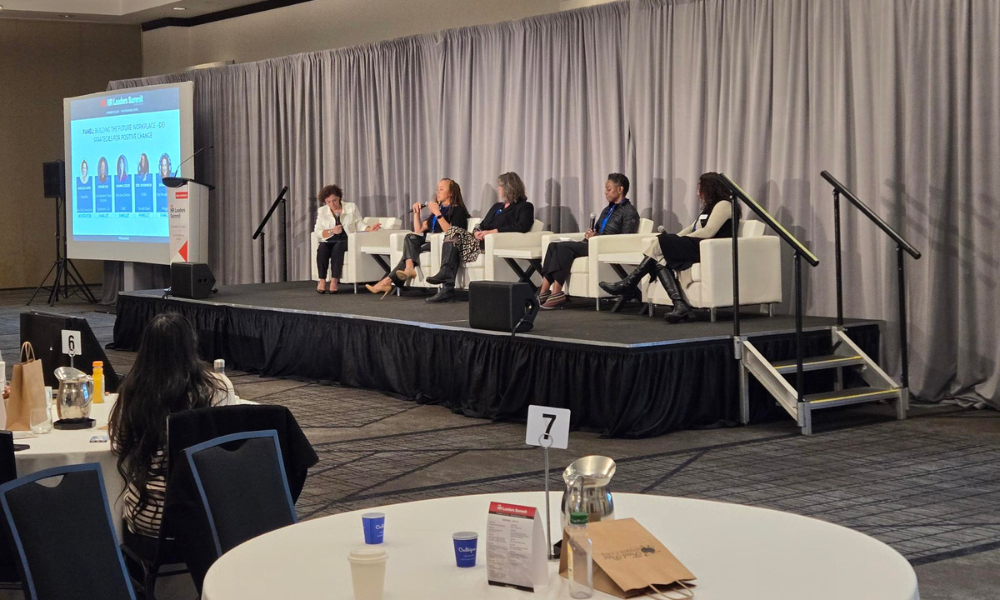
The US election challenged progress made by many companies, but Scotiabank VP says this just means it's time to go 'full force'

The Diversity, Equity, and Inclusion (DEI) backlash is “devastating”, but one HR leader believes a robust strategy can still spark lasting change.
In the wake of a divisive US presidential election, in which a female woman of colour who campaigned on women’s right to choose abortion lost, Denine Das, vice president of Global Inclusion at Scotiabank, chose not to shy away from the challenges surrounding DEI.
DEI programs have faced backlash across North America as views have become polarized. In the US, some universities have rolled back diversity-focused hiring initiatives, while high-profile figures, like Elon Musk, have publicly denounced DEI efforts, stating that "DEI must DIE."
This backlash has been further fueled by the Trump administration. In September 2020, former president Donald Trump issued an executive order aimed at prohibiting federal contractors from conducting what was described as "divisive" DEI training.
Although President Joe Biden later revoked the order, reports suggest that Trump’s allies have drafted a new executive order for immediate implementation upon his return to office. The proposed order seeks to dismantle programs that promote diversity, equity, and inclusion across federal agencies, according to the Harvard Business Review.
With the US setting a precedent for countries across the globe, the impact this will have on Canadian DEI policies remains unclear. However, Das warns that employers should not let this impact their decisions, instead focusing on what their employees need.
“We knew that the election was coming up in the States, we knew who the candidates were, but we’re still moving ahead with DEI with full force because we're not just centered around what happens in the States; we're centered around what's happening in the world and what do our employees need,” Das said. “The backlash is real, but what I would say is the backlash is only real when you give fuel to the fire.”
“In all honesty, the fear is that in the US, they're doing this, and we know we are up for an election soon, and we fear the same thing. If we always lived in fear, then many of us wouldn't walk, many of us wouldn't fly, many of us wouldn't do anything. It's the bold and the relentless that changes the world.”
Das addressed this backlash at HRD’s HR Leaders Summit on November 13 in Toronto and highlighted the need to continue the work despite opposition.
Most recently, Walmart was reported to be scaling back DEI policies, with the company halting its racial equity training programmes and its evaluation programmes aimed at increasing supplier diversity.
“We hear all these things—John Deere has pulled out; Locals has pulled out; all these companies are not doing DEI anymore. It’s so crazy and it’s so devastating,” she said at the summit. “If you’re part of leadership, this is part of what you do, then you go full force.”
For Das, the key to standing up to the backlash lies in amplifying voices that often go unheard. She emphasized that while DEI work is happening, it isn’t always visible. It’s a call to action to ensure that the work being done doesn’t remain in the shadows.
“For those who are supporters, we are not speaking loudly enough; we are not having our story told to combat or to counter the story that’s being told about us,” she said.
Das believes that for DEI initiatives to succeed, they must be deeply embedded in an organization’s leadership. This transparency—or lack thereof—can undermine the effectiveness of even the most well-intentioned DEI policies.
“When you look at the makeup of staff in an organization, it is incredibly stratified by race, age and gender. Anyone looking at an org chart could see clearly where the power lies and where it isn’t based on demographic,” she said.
Alongside this, Das also emphasized the importance of accountability, both at the top and throughout the organization to ensure alignment without stifling individual contributions.
“At the top of the pyramid, we have our all-day Inclusion Council. Our CEO sits on that, we have two executives that chair it, and it'll be some of the highest executives who sit on that, that have to be accountable for changes in their lines of business,” Das said.
“Below that, every area of business has their own inclusion council; we want to have a succinct conversation, and want to know what you’re talking about, because if Canadian banking is speaking about something, our wealth team is usually speaking about the same thing. These conversations are not just happening in one team, and they are not just the accountability of one team.”
Ultimately, Das highlighted that there is work that still needs to be done with regards to DEI, but that can’t be done while “hiding in the shadows.”
“The work is to be a pioneer out in front, just like we did to get the right to vote and for women to not need a man on to get a loan through a bank, and now, I work for a bank. None of us are ghosts, all these things have happened, and so we need to come with that same energy – the energy that if we really believe in this, then you go forward with it, and the backlash will come. We cannot fuel the fire for somebody else and think that it's going to keep us warm.”